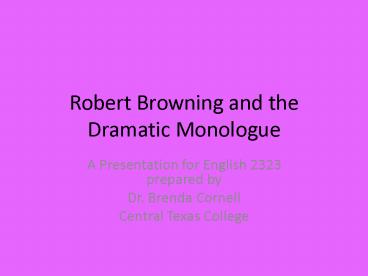Robert Browning and the Dramatic Monologue - PowerPoint PPT Presentation
1 / 7
Title:
Robert Browning and the Dramatic Monologue
Description:
Today, his most widely read work is Men and Women, a collection of dramatic monologues dedicated to his wife. According to the stories, ... – PowerPoint PPT presentation
Number of Views:2434
Avg rating:3.0/5.0
Title: Robert Browning and the Dramatic Monologue
1
Robert Browning and the Dramatic Monologue
- A Presentation for English 2323 prepared by
- Dr. Brenda Cornell
- Central Texas College
2
Background
- Robert Browning is one of the most famous poets
of the Victorian period. Although he mastered
many styles and techniques, Browning is most
famous for the dramatic monologue, defined as a
narrative poem in which the speaker addresses
someone who does not respond. Theres more to
this definition than meets the eye In his
narrative, the speaker tells two stories an
intentional one, the surface story he wants the
listener to hear, and an unintentional one, the
story about himself, which the listener must
infer. For the most part, like Chaucers
Canterbury pilgrims, Brownings speakers are not
aware of the psychological self-revelation
communicated in their inner stories.
3
Courtship and Marriage to Elizabeth Barrett
- Robert Browning was born in Camberwell, England,
and his education took place, for the most part,
among his fathers 6,000-book library. As a
writer, Browning was regarded as a failure for
many years, living in the shadow of his wife
Elizabeth Barrett Browning. However, late in life
Brownings brilliant use of dramatic monologue
made him a literary icon. Today, his most widely
read work is Men and Women, a collection of
dramatic monologues dedicated to his wife.
According to the stories, Browning presented
himself at Elizabeths door one day and told her
My dear Miss Barrett I have fallen in love with
your poems and with you. Thus began one of the
tenderest romances of all time.
(http//www.poetryfoundation.org/bio/robert-browni
ng)
4
Objections over-ruled!
- When she met Mr. Browning, Elizabeth was in a
wheelchair, victimized by tuberculosis. She had
never had a suitor because her over-protective
father would not allow young men to call upon his
daughter. Robert Browning, who asked to marry
Elizabeth, was no exception but unlike young men
before him, Browning was not afraid of Mr.
Barrett. Robert persisted in his courtship, and
Elizabeth agreed to marry him. They eloped and
set up housekeeping in Venice, Italy Elizabeth
gave birth to one child, a son and they all
lived happily ever after.
5
Personal References in Poetry
- Browning's Men and Women consists of fifty-one
poems, all of which are monologues spoken by
different narrators, some identified and some
not the first fifty take in a very diverse range
of historical, religious or European situations,
with the fifty-first - One Word More - featuring
Browning himself as narrator and dedicated to his
wife. The title of the collection came from a
line in her Sonnets from the Portuguese. Browning
himself was very fond of the collection,
referring to the poems as "My fifty men and
women" (from the opening line in One Word More),
and today, Men and Women has been described as
one of Victorian England's most significant
books. - http//en.wikipedia.org/wiki/Men_and_Women_(poetry
_collection)Poems_in_the_collection
6
Specific Features of the Dramatic Monologue
- M. H. Abrams notes the following three features
of the dramatic monologue as it applies to
poetry - A single person, who is patently not the poet,
utters the speech that makes up the whole of the
poem, in a specific situation at a critical
moment . - This person addresses and interacts with one or
more other people but we know of the auditors'
presence, and what they say and do, only from
clues in the discourse of the single speaker. - The main principle controlling the poet's choice
and formulation of what the lyric speaker says is
to reveal to the reader, in a way that enhances
its interest, the speaker's temperament and
character.1 - http//en.wikipedia.org/wiki/Dramatic_monologue
7
Works Cited
- http//www.poetryfoundation.org/bio/robert-brownin
g) - http//en.wikipedia.org/wiki/Dramatic_monologue
- http//en.wikipedia.org/wiki/Men_and_Women_(poetry
_collection)Poems_in_the_collection































